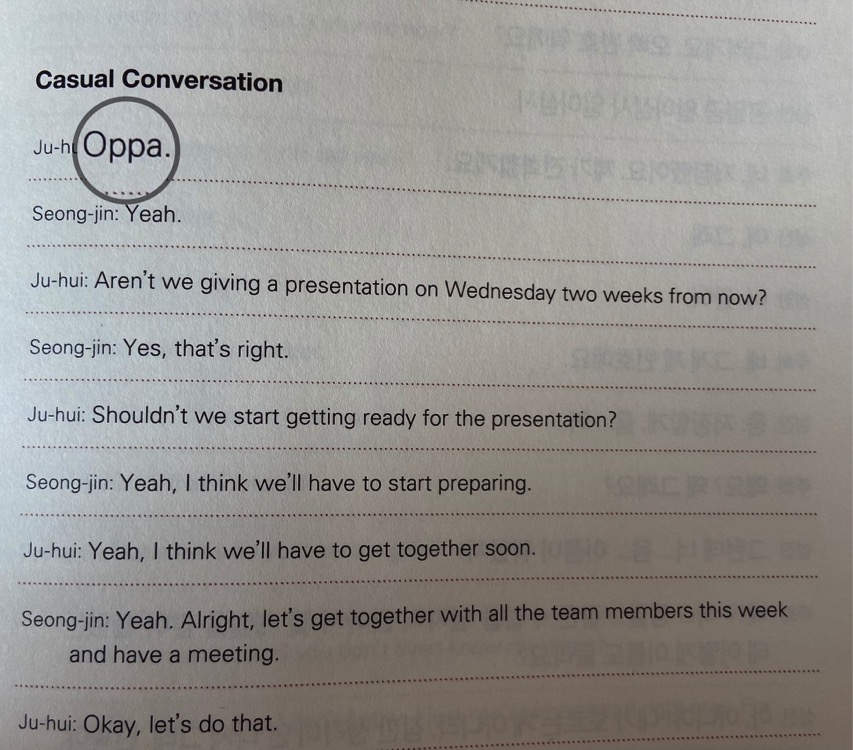SHARE
INFO
- DATE: 07-03-2021
- PLACE: Seoul
COUNTRY OF PROVENANCE

South Korea
RELATED ARTICLES

Seon and sogaeting, or when the date is not fully blind
Before reaching the milestone of the “couple look”, the ‘dating’ phase in Korea follows very specific rituals. Dates are, therefore, not fully blind.

The girl on the 22nd floor – Alessandra in South Korea
I’ve always lived on the second or third floor of low-rise buildings. From the twenty-second floor, what is far away is much sharper. Alessandra, South Korea

My Tips – Seoul, South Korea
Seoul is a city to live rather than visit. Choose carefully where to go during the day and in the evening. What to see – my Tips – Seoul, South Korea
Communication test: when the vocabulary is more complex than relationships
Alessandra from Seoul, South Korea
The previous post ended with the birth of a couple following a series of rituals typical of the dating phase in Korea. My curiosity towards the different forms of courtship arose from a mix of observation and stories of direct experiences of friends; however, the interest in human relations does not stop there, but regards also other contexts. Indeed, I am fascinated by the mechanisms that guide and regulate interactions, even more if it forces me to dig into the cultural background to find their origins.
Please, meet Oppa
At too close distance in public transport or on TV, I have often heard girls addressing their partners with the term “oppa”. For months I thought it meant something like “darling/sweethaeart”. However, I understood to be totally off track during the Korean language class on the subject of “family”. Indeed, oppa translates into English as “older brother“. Therefore, it is clear my confusion about this newly acquired knowledge in contrast with the images and dialogues I had in mind. Certainly, I would never define brothers and sisters neither the couples too close to me in the subway nor those on TV. Consequentely, I timidly confessed my doubt to my teacher, thinking about a trick of my bad hearing about two similar words. But no. This event was the deus ex machina for the beginning of a new journey through relationships.
The age difference as a generator of a rich vocabulary
In Korea, age plays a decisive role in the mechanisms of communication. It is certainly not surprising – and I think it is common to any culture – that age is at the base of the social hierarchy. However, here in Korea it strongly regulates interactions. Legacy of the Confucian culture, the way to address one’s interlocutor is a sensitive issue like the importance of blood ties. There are different ways of addressing according to kinship, generation and general relationship with our interlocutor. What changes are not only the verbal and nominal suffixes, but the vocabulary itself, sometimes also according to the masculine or feminine perspective.
Two words seem not to be enough…
An example is the simplest way to understand these differences. John has an older brother, Albert, an older sister, Anne, but younger than Albert, and Luise is the youngest of all. Albert is, therefore, the elder brother of John and also of the two sisters. Still, John will address him as hyung while the two sisters oppa. Anne is the elder sister of John and Luise. Yet, John will call her noona, while Luise unnie. In practice, the term that describes the relationship between brothers and sisters changes according to age and sex in the direction younger → older. In the opposite direction – older → younger- it is possible to address the interlocutor calling him/her by name.

… but too many words seem useless
The same approach is applied to other degrees of kinship, but often traced back to those just mentioned with the aim of identifying the generational relationship rather than kinship. Apparently, the origins of this mechanism date back to the organization of the territory around farmers’ villages where it was common for distant relatives to be able to live close together and meet very often. For this to address a distant relative in degree oppa, unnie, hyung or noona meant to shorten the distance and to feel him/her close as a brother or a sister. There are also more complex cases – which I will not explain this time – in which it is clear that we are not dealing with “generation” as an age group but genealogy.
Looking for informality
How is this explanation linked to the term “oppa” used by the girl in the couple? I believe everyone one has at least one relative towards whom does not feel any emotional conncection, while being extremely closed to someone outside the blood ties. Many Koreans use words like oppa, unnie, hyung and noona to address these people – longtime friends and companions – expressing their intention to be as informal as they would brothers and sisters. This approach takes on an even stronger meaning in a society where formality is required, not just at work. There are also cases in which the same terms are used with recently met people, with whom an immediate positive connection is established. However, this latter approach is more typical for young people than adults.

And at work?
In this case, the communication model is strongly regulated by the hierarchical relationship between two individuals imposed by the function not only by age. Indeed, it is preferred to address a colleague by calling the function rather than the name or qualification. The honorific suffix –nim is added to each function. For example, if I want to contact my colleague Frank Red in charge of human resources, I will not call him neither Mr. Red, nor Dr. Red, nor Frank, but “human resources manager-nim”. This is valid for both a business conversation and a lunch invitation. What about an after-work dinner? Well, it is the oldest who pays and the youngest who has to swallow as much soju as the oldest pours him.
You can check out my pictures on flickr here.
